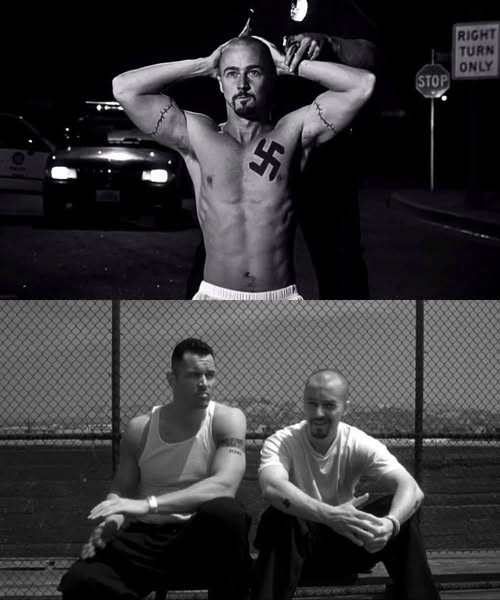American History X (1998) is a powerful and emotionally charged drama directed by Tony Kaye and written by David McKenna. Starring Edward Norton and Edward Furlong, the film explores the roots and consequences of hatred, racism, and redemption in modern America. It’s widely regarded as one of the most impactful social dramas of the late 20th century.
The film follows Derek Vinyard (Edward Norton), a former neo-Nazi skinhead who is released from prison after serving time for a brutal hate crime. Once a charismatic leader of a white supremacist group in Venice Beach, Derek returns home a changed man, deeply regretful of his past actions and ideology.


His younger brother, Danny (Edward Furlong), is still heavily influenced by Derek’s former beliefs. The narrative unfolds through Danny’s school essay—a reflection on his brother’s life—which serves as the framing device. Through flashbacks in stark black-and-white, we see Derek’s descent into hate, the violent acts he committed, and the turning point that led him to reevaluate everything while incarcerated.
As Derek tries to prevent Danny from following the same destructive path, the film becomes a gripping story of redemption, brotherhood, and the cyclical nature of hatred.
Edward Norton gives a career-defining performance, earning an Academy Award nomination for Best Actor. His transformation—both physical and emotional—is startling, portraying Derek’s journey with raw intensity and haunting vulnerability.
Edward Furlong also delivers a deeply emotional performance as the impressionable and conflicted Danny, whose quiet narration adds weight to the film’s message.
American History X doesn’t shy away from portraying the ugliness of racism, but it also humanizes its characters without excusing their actions. It explores how hate is learned, passed down, and ultimately how it can be unlearned—through pain, experience, and reflection.
The film is a brutal critique of systemic racism, white supremacy, and the prison-industrial complex, but also a deeply personal story about the power of change.
The haunting final scenes and its unforgettable closing line—“Hate is baggage.”—linger long after the credits roll.
Tony Kaye’s direction uses a mix of black-and-white and color to distinguish between past and present, emphasizing memory and transformation. The cinematography and pacing heighten the emotional weight, and Anne Dudley’s subtle score adds a layer of melancholy throughout.
American History X is not an easy film to watch, but it’s an essential one. Raw, provocative, and deeply human, it challenges viewers to confront uncomfortable truths and consider the possibility of redemption. Over two decades later, its themes remain painfully relevant.

